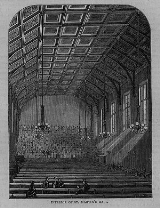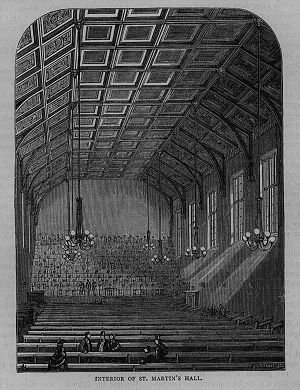
John Pyke Hullah
Encyclopedia
John Pyke Hullah English
composer and teacher of music, was born at Worcester
.
He was a pupil of William Horsley
from 1829, and entered the Royal Academy of Music
in 1833. He wrote an opera to words by Dickens
, The Village Coquettes, produced in 1836; The Barbers of Bassora in 1837, and The Outpost in 1838, the last two at Covent Garden
. From 1839, when he went to Paris
to investigate various systems of teaching music to large masses of people, he identified himself with Wilhem's system of the fixed "Do," and his adaptation of that system was taught with enormous success from 1840 to 1860.
 In 1847 a large building in Long Acre
In 1847 a large building in Long Acre
, called St Martin's Hall
, was built by subscription and presented to Hullah. It was inaugurated in 1850 and burnt to the ground in 1860, a blow from which Hullah was long in recovering. A series of lectures was given at the Royal Institution
in 1861, and in 1864 he lectured in Edinburgh, but in the following year was unsuccessful in his application for the Reid professorship.
He conducted concerts in Edinburgh
in 1866 and 1867, and the concerts of the Royal Academy of Music from 1870 to 1873; he had been elected to the committee of management in 1869. In 1872 he was appointed by the Council of Education musical inspector of training schools for the United Kingdom. In 1878 he went abroad to report on the condition of musical education in schools, and wrote a very valuable report, quoted in the memoir of him published by his wife in 1886. He was attacked by paralysis in 1880, and again in 1883.
His compositions, which remained popular for some years after his death in 1884, consisted mainly of ballads (such as his musical adaptation of Charles Kingsley
's poem, "Three Fishers
"); but his importance in the history of music is owing to his exertion in popularizing musical education, and his persistent opposition to the Tonic Sol-Fa system, which had a success he could not foresee. His objections to it were partly grounded on the character of the music which was in common use among the early teachers of the system.
While it cannot be doubted that Hullah would have won more success if he had not opposed the Tonic Sol-Fa movement so strenuously, it must be confessed that his work was of great value, for he kept constantly in view unimpressed upon all who followed him or learnt from him the supreme necessity of maintaining the artistic standard of the music taught and studied, and of not allowing trumpery compositions to usurp the place of good music on account of the greater ease with which they could be read.
----
England
England is a country that is part of the United Kingdom. It shares land borders with Scotland to the north and Wales to the west; the Irish Sea is to the north west, the Celtic Sea to the south west, with the North Sea to the east and the English Channel to the south separating it from continental...
composer and teacher of music, was born at Worcester
Worcester
The City of Worcester, commonly known as Worcester, , is a city and county town of Worcestershire in the West Midlands of England. Worcester is situated some southwest of Birmingham and north of Gloucester, and has an approximate population of 94,000 people. The River Severn runs through the...
.
He was a pupil of William Horsley
William Horsley
William Horsley was an English musician.In 1790 he became the pupil of Theodore Smith, an indifferent musician of the time, who, however, taught him sufficiently well to obtain the position of organist at Ely Chapel, Holborn, in 1794...
from 1829, and entered the Royal Academy of Music
Royal Academy of Music
The Royal Academy of Music in London, England, is a conservatoire, Britain's oldest degree-granting music school and a constituent college of the University of London since 1999. The Academy was founded by Lord Burghersh in 1822 with the help and ideas of the French harpist and composer Nicolas...
in 1833. He wrote an opera to words by Dickens
Charles Dickens
Charles John Huffam Dickens was an English novelist, generally considered the greatest of the Victorian period. Dickens enjoyed a wider popularity and fame than had any previous author during his lifetime, and he remains popular, having been responsible for some of English literature's most iconic...
, The Village Coquettes, produced in 1836; The Barbers of Bassora in 1837, and The Outpost in 1838, the last two at Covent Garden
Royal Opera House
The Royal Opera House is an opera house and major performing arts venue in Covent Garden, central London. The large building is often referred to as simply "Covent Garden", after a previous use of the site of the opera house's original construction in 1732. It is the home of The Royal Opera, The...
. From 1839, when he went to Paris
Paris
Paris is the capital and largest city in France, situated on the river Seine, in northern France, at the heart of the Île-de-France region...
to investigate various systems of teaching music to large masses of people, he identified himself with Wilhem's system of the fixed "Do," and his adaptation of that system was taught with enormous success from 1840 to 1860.

Long Acre
Long Acre is a street in central London, England. Starting from St. Martin's Lane it runs from west to east just north of Covent Garden piazza, one block north of Floral Street. The street was completed in the early 17th century. It was once known for its coach-makers, and later for its car dealers...
, called St Martin's Hall
Queen's Theatre, Long Acre
The Queen's Theatre was established in 1867, as a theatre on the site of St Martin's Hall, a large concert room that opened in 1850. It stood on the corner of Long Acre and Endell Street, with entrances in Wilson Street and Long Acre...
, was built by subscription and presented to Hullah. It was inaugurated in 1850 and burnt to the ground in 1860, a blow from which Hullah was long in recovering. A series of lectures was given at the Royal Institution
Royal Institution
The Royal Institution of Great Britain is an organization devoted to scientific education and research, based in London.-Overview:...
in 1861, and in 1864 he lectured in Edinburgh, but in the following year was unsuccessful in his application for the Reid professorship.
He conducted concerts in Edinburgh
Edinburgh
Edinburgh is the capital city of Scotland, the second largest city in Scotland, and the eighth most populous in the United Kingdom. The City of Edinburgh Council governs one of Scotland's 32 local government council areas. The council area includes urban Edinburgh and a rural area...
in 1866 and 1867, and the concerts of the Royal Academy of Music from 1870 to 1873; he had been elected to the committee of management in 1869. In 1872 he was appointed by the Council of Education musical inspector of training schools for the United Kingdom. In 1878 he went abroad to report on the condition of musical education in schools, and wrote a very valuable report, quoted in the memoir of him published by his wife in 1886. He was attacked by paralysis in 1880, and again in 1883.
His compositions, which remained popular for some years after his death in 1884, consisted mainly of ballads (such as his musical adaptation of Charles Kingsley
Charles Kingsley
Charles Kingsley was an English priest of the Church of England, university professor, historian and novelist, particularly associated with the West Country and northeast Hampshire.-Life and character:...
's poem, "Three Fishers
Three Fishers
"Three Fishers" is a poem and a folk song written in 1851. The original poem was written by English poet, novelist and preacher, Charles Kingsley. It was first set to music by English composer John Hullah shortly thereafter...
"); but his importance in the history of music is owing to his exertion in popularizing musical education, and his persistent opposition to the Tonic Sol-Fa system, which had a success he could not foresee. His objections to it were partly grounded on the character of the music which was in common use among the early teachers of the system.
While it cannot be doubted that Hullah would have won more success if he had not opposed the Tonic Sol-Fa movement so strenuously, it must be confessed that his work was of great value, for he kept constantly in view unimpressed upon all who followed him or learnt from him the supreme necessity of maintaining the artistic standard of the music taught and studied, and of not allowing trumpery compositions to usurp the place of good music on account of the greater ease with which they could be read.
External links
- Derek B Scott sings Hullah's setting (1857) of Charles Kingsley's "Three Fishers Went Sailing"
- Free scores at the Mutopia ProjectMutopia projectThe Mutopia Project is a volunteer-run effort to create a library of free content sheet music, in a way similar to Project Gutenberg's library of public domain books.The music is reproduced from old scores that are out of copyright...
----

